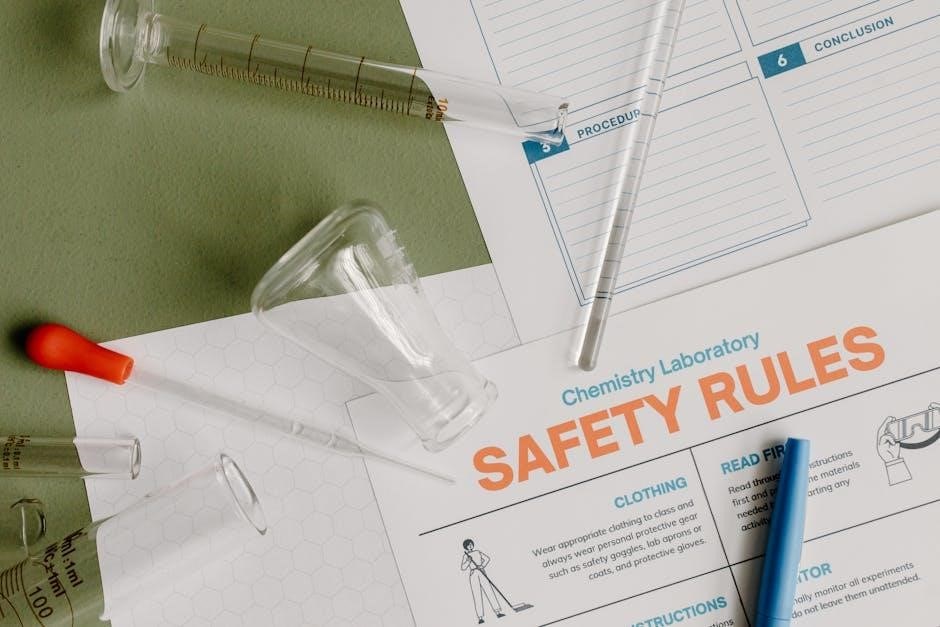Introducing the 360 Training Food Handlers Final Exam, a critical certification ensuring food safety knowledge․ This exam covers essential topics like food safety regulations, proper hygiene practices, and temperature control, preparing handlers to maintain safe food environments․
Overview of the Exam and Its Importance
The 360 Training Food Handlers Final Exam is a critical component of food safety certification, ensuring individuals understand essential practices to maintain safe food environments․ It assesses knowledge of regulations, hygiene, and safe handling techniques, crucial for preventing foodborne illnesses․ Passing the exam demonstrates competence in protecting public health, making it vital for anyone involved in food preparation or service․ The certification is widely recognized and often required by employers to meet legal and safety standards in the food industry․
Understanding the Format and Requirements
The 360 Training Food Handlers Final Exam is a multiple-choice assessment designed to evaluate knowledge of food safety principles․ Typically consisting of 60-75 questions, the exam must be completed within a specified time frame, often 60 minutes․ A passing score of 75% or higher is usually required․ The exam is administered online, and participants must ensure a stable internet connection․ Proper identification may be needed to verify the test-taker’s identity․ The format focuses on key areas like food safety basics, handling practices, temperature control, and cross-contamination prevention, ensuring comprehensive understanding of safe food handling protocols;

Key Topics Covered in the 360 Training Food Handlers Exam
The 360 Training Food Handlers Exam covers essential food safety topics, including food safety basics, regulations, proper handling practices, temperature control, cross-contamination prevention, and health standards․
Food Safety Basics and Regulations
Food safety basics focus on preventing contamination and ensuring safe food handling practices․ Understanding regulations is crucial for maintaining compliance with health codes and standards․ These principles form the foundation of food safety, ensuring that food handlers can protect consumers from foodborne illnesses․ Proper training and adherence to these guidelines are essential for upholding public health and safety in the food industry, preventing legal issues, and maintaining a good reputation and consumer trust․
Proper Food Handling and Hygiene Practices
Proper food handling and hygiene practices are essential to prevent contamination and ensure food safety․ This includes frequent handwashing with soap and water, especially before handling food and after touching raw ingredients․ Food handlers should avoid cross-contamination by separating raw and ready-to-eat foods․ Additionally, wearing protective gear like gloves and hairnets is crucial․ Maintaining personal hygiene, such as trimming nails and covering wounds, further reduces contamination risks․ These practices are vital for safeguarding public health and preventing foodborne illnesses in any food service environment․
Temperature Control and Food Storage Guidelines
Temperature control is crucial in food safety to prevent bacterial growth․ Foods must be stored at appropriate temperatures, avoiding the danger zone of 40°F to 140°F․ Proper storage involves separating raw and cooked foods to prevent cross-contamination․ Labeling and dating stored items ensure they are used before spoilage occurs․ Maintaining cleanliness and correct storage temperatures is essential to uphold food safety standards and prevent foodborne illnesses․

Preventing Cross-Contamination and Pest Control
Preventing cross-contamination involves separating raw and ready-to-eat foods, using dedicated utensils, and ensuring thorough cleaning and sanitizing of surfaces and equipment․ Proper handwashing and glove use are critical․ Pest control requires eliminating attractants like food debris and standing water, sealing entry points, and using traps or professional services․ Regular inspections and maintaining a clean environment help prevent pest infestations, ensuring a safe food handling process and compliance with health standards․
Understanding Health and Hygiene Standards
Understanding health and hygiene standards is crucial for maintaining a safe food environment․ Proper handwashing techniques, such as scrubbing for at least 20 seconds and using soap and water, are emphasized․ Personal cleanliness, including clean uniforms and no jewelry, is essential․ Glove usage is addressed, with guidelines on when and how to use them․ These practices prevent the spread of illnesses and ensure compliance with food safety regulations, promoting a hygienic workplace and protecting public health․ Regular training reinforces these standards, ensuring consistency and adherence․

Study Strategies for Success
Effective study strategies involve active learning techniques and consistent practice․ Utilize practice exams to reinforce knowledge and manage your time wisely to ensure comprehensive preparation for the exam․
Effective Study Techniques for Food Handlers Exam
Effective study techniques include active learning, such as engaging with practice questions and flashcards․ Utilize spaced repetition to reinforce key concepts over time․ Focus on understanding food safety regulations, hygiene practices, and temperature control․ Incorporate visual aids like diagrams and charts to better grasp complex topics․ Regularly review study materials and take timed practice exams to simulate test conditions․ Prioritize areas where you need improvement and seek additional resources when necessary․ Consistent practice and structured study schedules enhance retention and confidence for exam success․

Importance of Practice Exams and Quizzes
Practice exams and quizzes are essential for assessing knowledge and readiness for the 360 Training Food Handlers Final Exam; They simulate real test conditions, helping you familiarize yourself with the format and timing․ Regularly taking practice quizzes identifies weak areas, allowing targeted study․ Timed exercises improve time management skills, ensuring you can answer all questions within the allotted time․ Additionally, practice exams reduce exam anxiety by building confidence in your ability to apply food safety principles effectively․ Consistent use of practice materials enhances overall preparedness and retention of critical information․
Time Management Tips for Exam Preparation

Effective time management is crucial for successful exam preparation․ Create a structured study plan, allocating specific time slots for each topic․ Set daily goals and prioritize key areas, ensuring a balanced review of all subjects․ Break study sessions into shorter intervals with breaks to maintain focus; Utilize timers for practice questions to simulate exam conditions․ Avoid cramming by distributing study material evenly over time․ Organize your schedule to cover weaknesses and strengths, ensuring comprehensive preparation․ Consistent, timed practice enhances retention and reduces exam-day stress, helping you stay calm and focused during the final exam․

Resources for Exam Preparation
Access online courses, practice exams, and study guides to prepare effectively․ Utilize 360 Training materials, including PDF guides and forums, to ensure comprehensive understanding and exam readiness․
Recommended Study Materials and Guides
Enhance your exam preparation with official 360 Training study guides and resources․ Utilize practice exams, food safety manuals, and online tutorials to master key concepts․ The 360 Training Food Handlers Final Exam Answers PDF provides detailed explanations and model answers, helping you understand common questions and improve your performance․ Additionally, refer to food safety regulations and hygiene practice guides to reinforce your knowledge and ensure compliance with industry standards․
Online Courses and Training Programs
Supplement your exam preparation with online courses and training programs designed for food handlers․ The 360 Training platform offers comprehensive modules covering food safety, hygiene, and regulations․ These courses provide interactive content, videos, and quizzes to engage learners․ They also include real-world examples and scenarios to enhance understanding․ Many programs offer flexible pacing, allowing you to study at your convenience․ By completing these courses, you can gain confidence and a deeper understanding of food safety principles, ensuring you’re well-prepared for the final exam․
Practice Questions and Answer Keys
Enhance your preparation with practice questions and answer keys tailored for the 360 Training Food Handlers Final Exam․ These resources provide realistic exam simulations, helping you assess your knowledge of food safety, hygiene, and regulations․ Practice questions cover topics like food temperatures, cross-contamination, and pest control․ Answer keys offer detailed explanations, clarifying doubts and reinforcing learning․ Regularly reviewing these materials helps identify weak areas and builds confidence․ Utilize these tools to refine your understanding and ensure readiness for the actual exam․

Test-Taking Tips and Best Practices
Mastering the 360 Training Food Handlers Final Exam requires strategic approaches․ Focus on understanding question formats, managing time effectively, and staying calm․ Systematic answering enhances accuracy and efficiency․
How to Approach Multiple-Choice Questions
When tackling multiple-choice questions, start by carefully reading each question and identifying key terms․ Eliminate obviously incorrect answers first to narrow down choices․ Pay attention to specific phrasing, such as “always” or “never,” which often indicate correct answers․ Manage your time wisely, allocating about 30 seconds per question․ If unsure, make an educated guess based on prior knowledge․ Utilize practice exams to familiarize yourself with the format and improve decision-making skills․ Stay calm and systematic to enhance accuracy and confidence․
Strategies for Reducing Exam Anxiety
Reducing exam anxiety starts with proper preparation and mindset․ Practice deep breathing exercises to calm nerves, and visualize success to build confidence․ Break study sessions into manageable chunks to avoid overwhelm․ Prioritize sleep and nutrition to maintain mental clarity․ Reframe negative thoughts into positive affirmations, focusing on readiness rather than fear of failure; Arrive early to the exam location to ease stress․ Remember, anxiety is natural, but controlled breathing and systematic approaches can help manage it effectively, ensuring you perform at your best․
Importance of Reading Instructions Carefully
Reading instructions carefully is crucial for success in the 360 Training Food Handlers final exam․ It ensures understanding of question formats and requirements, preventing unnecessary errors․ Misreading can lead to incorrect answers or missed questions, impacting overall performance․ Always take a moment to review directions thoroughly before proceeding․ This practice helps in managing time effectively and reduces stress during the exam․ Clear comprehension of instructions ensures that your knowledge is accurately reflected in your responses․ Attention to detail is key to achieving the best possible results․

Final Exam Day Preparation
Ensure you arrive early, bring required documents, and stay calm․ Review last-minute notes and avoid guessing to maintain confidence․ Proper preparation guarantees a smooth exam experience․
What to Expect on the Day of the Exam
On exam day, arrive early to complete check-in procedures․ Bring valid ID and any required documents․ The exam will be conducted in a quiet, supervised environment․ Expect multiple-choice questions covering food safety, hygiene, and temperature control․ Carefully read instructions and manage your time effectively․ No electronic devices or notes are allowed․ Stay calm and answer confidently based on your preparation․ Results are typically available immediately after completion․ Proper adherence to exam rules ensures a smooth experience and valid certification upon passing․
Do’s and Don’ts for Exam Success
Do arrive early, bring required documents, and read instructions carefully․ Stay calm, manage your time, and answer confidently․ Avoid bringing unauthorized materials, guessing blindly, or panicking․ Refrain from discussing the exam during or after․ Ensure all questions are attempted, and review your answers if time permits․ Follow all proctor instructions to maintain exam integrity․ Proper preparation and adherence to these guidelines will enhance your chances of success and ensure a fair, stress-free experience․
Passing the 360 Training Food Handlers Final Exam confirms your knowledge of food safety and hygiene, enabling safe food handling and adherence to health standards․ Keep learning to stay updated․
Summarizing Key Points for Last-Minute Revision
For last-minute revision, focus on key areas like food safety basics, proper hygiene, temperature control, and cross-contamination prevention․ Review health standards and pest control measures․ Practice identifying high-risk foods and understanding foodborne illnesses․ Brush up on safe food handling and storage practices․ Ensure familiarity with local regulations and workplace-specific protocols․ Use flashcards or practice exams to reinforce knowledge․ Pay attention to time management during the exam and read questions carefully․ Confidence and clarity will aid in selecting correct answers efficiently․
Maintaining Food Safety Knowledge Beyond the Exam
Maintaining food safety knowledge is crucial beyond the exam․ Continuous learning through refresher courses and updated guidelines ensures ongoing compliance․ Apply practical skills daily, such as proper hygiene and temperature control․ Stay informed about foodborne illnesses and new regulations․ Engage in workplace training and share best practices with colleagues․ Regularly review food safety materials and participate in industry updates․ By staying proactive, food handlers can ensure a safe and healthy environment for consumers and uphold high food safety standards consistently․
